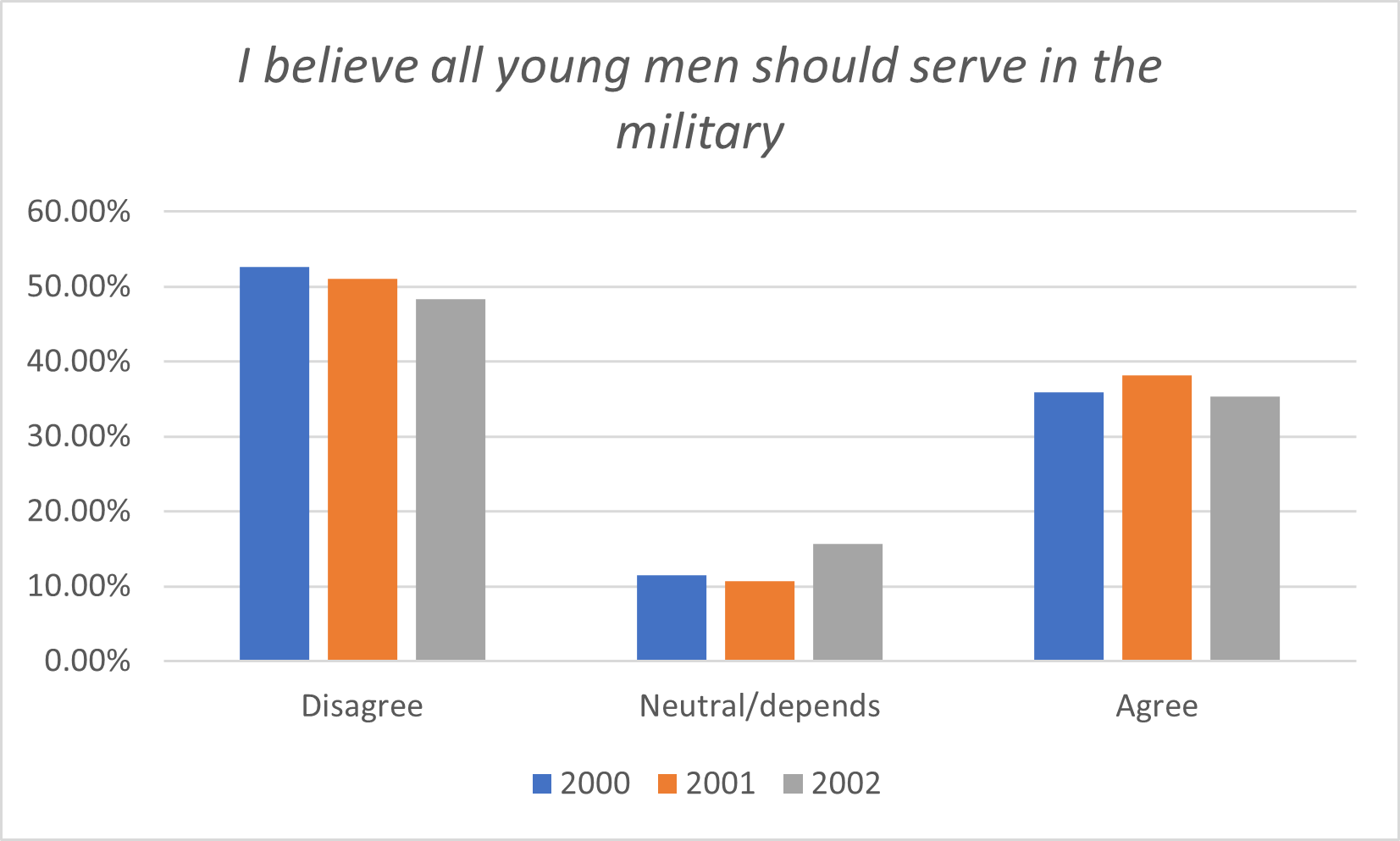Introduction
Many people serve in the military willingly, such as my peers and myself. However, as many readers probably know, some individuals didn’t have the option to choose whether or not they serve. Mandatory military service has been used by many governments, including mine. Some governments use it during times of peace to build loyalty and a sense of duty, while others use it during times of war to build an army. Requiring citizens to serve in the military does a great job at raising troops, but citizens tend to hate it. According to a study conducted during the War on Terror, in 2002, only 35.3% of people in the US believed all men should serve in the military. If only 1/3 of the United States population in 2002 believed all men should serve in the military, it would make sense that citizens would support it even less if women were included in the draft as well. Mandatory military service has been used, and detested, in most American wars since the Civil War. Some of these wars were considered good and moral, but in each war, there were people who thought that it was bad and wrong. Mandatory military service is usually disliked by United States Citizens, even during wars that were generally supported.
There are many theories as to why leaders institute mandatory military service. One of these comes from James Boswell. Boswell states that to "prepare instruments for the destruction of our species at large, is what I now see may very well be done by ordinary men, without starting, when they themselves are to run no risk." Boswell believes that ordinary men are willing to send people off to fight and die, knowing that they will not be the ones in harm’s way. In my opinion, Boswell misattributes these workers' actions to indifferent greed rather than a desire to earn a wage to stay alive and feed a family. However, if you take Boswell’s perspective, it is easy to see how a draft might come about. If the leaders of a nation want something and war is the best way to get it, then these leaders that Boswell considers evil would be more than willing to go to war. They would also be willing to force people to fight in that war. Boswell believes war is bad, which isn't exactly a hot take, but his reasons for it are relatively weak. He thinks war is only supported by those in charge of conducting the war and those who have been tricked or forced into fighting it, but doesn’t explain what would convince someone to fight in a war. Boswell also does not account for people who willingly and enthusiastically go to war. He would categorize them as fools who have bought into the propaganda created by the leaders of their country. Boswell believes that if humans would go without war long enough to forget it, the idea of war would seem preposterous. I believe most people can see the absurdity of that idea. Does Boswell really think that humans only engage in war because that's what we've always known? That people would go and die for something because that's the status quo? Boswell acts as if nobody has thought about war and when it would be necessary. Thankfully, George Orwell has a better explanation. Nationalism is "the habit of identifying oneself with a single nation or other unit, placing it beyond good and evil and recognizing no other duty than that of advancing its interests". According to Orwell, some people are willing to fight and die for their country just because they think they are better than everyone else. This idea is interesting and a possible explanation. People would be willing to send others to war if they think it is the right thing to do, and a nationalist would probably believe that. Robert Heinlein gives another example of when mandatory military service is instituted that may make more sense in some cases. In the book Starship Troopers, Robert Heinlein writes “The unlimited democracies were unstable because their citizens were not responsible for the fashion in which they exerted their sovereign authority ... other than through the tragic logic of history”. Some countries require everyone to be in the military for a certain period of time. Heinlein argues that this is good as it creates a sense of ownership for the country. Starship Troopers, one of my favorite books, does a good job of making one feel patriotic. However, it does not convince me that it is a good idea to have only those who have served vote. In history classes here at West Point, we talk a lot about why people serve and the importance of Citizen Soldiers (people who serve and fulfill another role in society). Citizen soldiers are important because they bring society into the military, not the other way around. I’ve known many people that appreciate the U.S. that have not served in the military. The military is not for everyone, so using it to gatekeep the right to vote is wrong.

In the United States today, there is little support for mandatory military service. In 2002, the results of a survey stated that only 35.3% of people believe that all young men should serve in the military. These people were surveyed a year after 9/11, which was known to have increased support for the military and the United States. If people didn’t widely support mandatory military service immediately following 9/11, it is unlikely that there would be any reason for widespread support. Additionally, the survey only asked about young men, not women. Women have been given more opportunities to serve in the military to include combat roles since that survey was taken. Any mandatory military service instituted today would need to include women, especially considering the military's larger focus on equality. People who hold outdated values would likely not be okay with forcing women into the military due to their belief in a lack of capabilities. It also increases the likelihood that someone an individual knows would be drafted. Someone would be more likely to support conscription if it didn’t affect them or someone they know. If a parent believes a war is important and has a daughter who would not be drafted, they would support the draft more than if it would draft their daughter. The fact that more people would be affected by mandatory military service if instituted today means that there is likely to be significantly less support.
People that believe they are freer are less likely to support mandatory military service. “[The world] has generally become more open, more democratic, and more economically free along many dimensions (Gwartney 2009; Sheehan and Young 2015). One of those dimensions is the use of conscription for military purposes”. Tarabar makes the argument that as countries become more democratic, they are less likely to impose mandatory military service. This makes sense because people don't like to be told what to do, especially if they are already accustomed to not being told what to do. They may not necessarily be opposed to military service, but they would not like the idea of being forced to serve. They would also likely hate the idea of forcing others to serve. When I was at Buckeye Boy's State, Governor of Ohio Mike DeWine spoke to a group of students. Someone asked what the hardest decision he had to make as a public official was, and he told us that it was making the decision to go to war. When he voted, he knew his action would directly lead to the deaths of individuals. Not only would the enemy be killed, but also American soldiers, and this weighed heavily on him. This is in opposition to ideas like Orwell’s belief in nationalism. Orwell believes that there are many nationalists and those nationalists would support mandatory military service. Tarabar’s statistics show that this is not the case, and the nationalistic view becomes even less accurate with time. The world, and the United States, is trending towards being more economically and democratically free, which means that mandatory military service is becoming more and more unpopular.
Freedom
So What?
Mandatory military service is almost always unsupported. It is something that weighs heavily on the minds of Congress, as they are responsible for the war and the required service. It affects individuals and their families in an almost universally negative way. Many people did not want to comply with their mandatory service. I, and likely many readers of this article, know someone who was drafted into a war and who did not want to go. If mandatory military service is not supported by citizens, then Congress should refrain from using it as an option for building an army for war or bolstering defenses during times of peace. Some people, like James Boswell, have theorized that mandatory military service exists because the leaders of countries wish to use people they have control over to achieve their own goals. Others, like George Orwell, have theorized that it exists because some groups believe that they are superior to others, leading to an entire body of people thinking service should be mandatory, as opposed to only their leaders. However, statistics have proven that these ideas are not true, as there are very few people that support mandatory military service. Even the "Great Generation" of World War II was resistant to their draft. Not only does mandatory military service subject people to harm by sending them to war, it associates them with a war that they may be totally against. Free people hate this notion, which is why Congress should avoid mandatory military service if at all possible. Instead, Congress and military leadership should focus on making the military more appealing to people who already may have had an interest in serving and should not take actions that many people may not be in support of.
Contact: brendan.degryse@westpoint.edu
This article does not speak on behalf of the United States government, to include the United States Military Academy, United States Army, or the United States Department of Defense.
